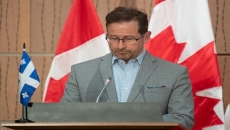The federal government has released updated figures showing once again that Canadian veterans are at greater risk of suicide than those who have never served in uniform.
The new figures add two more years of data to an earlier landmark study published in December 2017, which analyzed the records of more than 200,000 veterans who had served between 1976 and 2012 to determine if they were more prone to suicide.
The new figures, which cover the period from 1976 to 2014, show men who had served in the military during that period were 39 per cent more likely to die by suicide than men in the general population, a three per cent increase from the first study.
The risk was significantly higher among younger male veterans, with those under 25 being 252 per cent more likely to kill themselves than non-veterans of the same age — a 10 per cent increase from before.
The new data also continued a trend showing that male veterans over the age of 55 were less likely to die by suicide than men of the same age in the general population.
The risk among female veterans was also found to be alarmingly high — 88 per cent greater than for women who had not served. That compared to 81 per cent in the previous figures. Age was not considered as great a factor when it came to women in uniform.
The statistical study does not delve into why veterans are at greater risk of suicide than the general population or the reasons for the slight increases among some segments of the community.
"Every veteran we lose is a profound tragedy and we need to continue to do everything we can to prevent veteran suicides," Veterans Affairs Minister Lawrence MacAulay said in a statement accompanying the release of the new figures.
"As part of that effort, the Veteran Suicide Mortality Study is an important tool in helping us better understand the complex and tragic reality of suicide within the veteran community."
The study published in 2017 was the first of its kind and appeared to confirm what until then had been only anecdotal evidence.
The federal government promised at the time to roll out more services and support to serving and retired military personnel through a new suicide prevention strategy.






